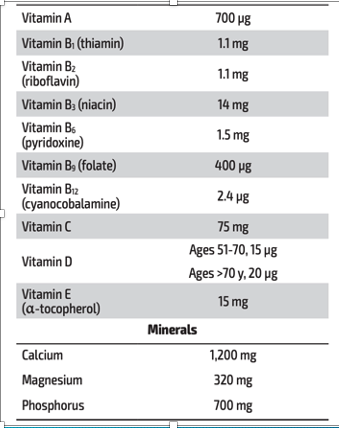One of the common questions I’m asked is what supplements to take. Even if you eat a well balanced diet, it can still be helpful to get certain minerals and vitamins into your diet. But which ones? And how much?
Dietary supplement recommendations vary as we age and as you might expect, what is good for children, young adults and reproductive aged women may not be what is best for midlife women. The table below is what the US Department of Health and Human Services recommends.
I don’t go by this list exclusively. Many of the women I see, even the ones who spend time in sunbelt areas, are low on vitamin D (25 OH vitamin D or D3). For that reason I suggest you get your vitamin D level checked every other year to be sure yours isn’t low. If it is low, you might need doses of 5,000 IU daily to 50,000 IU/week. Vitamin D may not only help protect your bones, it’s been shown to help prevent Covid19 infections, improve muscle strength, may help with hair loss and hot flashes, and has also been suggested to lower the risk of breast cancer, pancreatic cancer and diabetes. May interact with steroids, statins and thiazide diuretics.
Calcium is essential for many body functions and especially for protecting your bones. Calcium citrate can be taken any time. Most of the others must be taken with meals.
If you take magnesium, I suggest magnesium oxide. Others, particularly magnesium citrate, can serve as a laxative that has undesirable effects on your GI tract. Since calcium and magnesium compete for absorption, don’t take more than 600 mg combined of those two minerals at the same time. Larger amounts won’t be absorbed.
I also recommend taking 1,000 mg to 2,000 mg of Omega 3 fatty acids daily. They’re good for your head, your heart and your bones.
Remember to discuss your supplements with your healthcare provider. Your particular needs may vary and there may be interactions with medications you are taking. But the list below and my suggestions in the text will help you get the supplements you need for a healthy midlife. Don’t forget that eating lots of fruits and vegetables, avoiding sugar, high salts and packaged foods, along with regular exercise is also an important part of the recipe.

US Department of Health and Human Services; US Department of Agriculture. 2015–2020 Dietary Guidelines for Americans. 8th ed. December 2015; Harris HR, et al Eur J Cancer. 2014;50(7):1223-1231.
